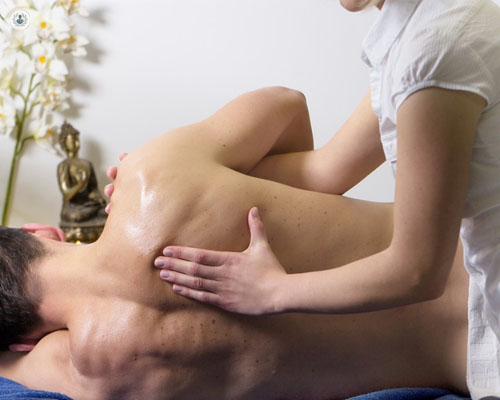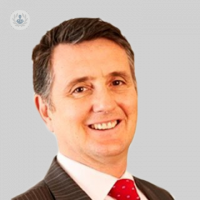What are the most common conditions that affect the rotator cuff?
Written in association with:In this informative article, highly renowned consultant orthopaedic surgeon, Mr Steven Corbett, explains what the rotator cuff is, and tells us what conditions most typically affect this specific body part.

What is the rotator cuff?
The rotator cuff is a family of muscles-tendons which help move the ball (humeral head) in the socket (glenoid) of the main shoulder joint (glenohumeral joint). The tendons attach the muscles to the bone. They are arranged similar to a hood over the joint, starting at the front and then going over the top to the back.
The tendons comprise the supraspinatus, infraspinatus, subscapularis and teres minor. The supraspinatus tendon initiates lifting of the shoulder. It also helps stabilise the humeral head in the glenoid during movements. The infraspinatus and teres minor muscles externally rotate the shoulder joint. Again, these tendons also help provide stability.
The subscapularis causes internal rotation of the shoulder. This further supports the shoulder by centring the humeral head in the socket.
What are the most common conditions that affect the rotator cuff?
The most common problem to affect the rotator cuff is shoulder inflammation. This can result either from trauma or non - traumatic circumstances. Most commonl,y the supraspinatus tendon is affected.
As a result of inflammation, it may be difficult to elevate the arm above shoulder height, due to pain and weakness. Additionally, there may be a catch-pinching sensation which is known as impingement. Inflammation of the rotator cuff is often associated with subacromial bursitis, which is inflammation of the bursa which overlies the tendons and sits under the acromion bone on the top of the shoulder.
Tears of the rotator cuff tendons can also occur. These tears may be partial or full thickness. The tendons themselves not only have a thickness but also a length of several centimetres. Hence, even in the presence of a full thickness tear, there may be still some tendon left attached to the bone.
In people over the age of 45 years, 1 in 4 people if imaged may have a partial tear of the rotator cuff, even if the shoulder is performing normally. Similarly, in people over the age of 65, 1 in 4 people may have a full thickness tear, even if the shoulder seems normal.
However, tears can result in pain, weakness, limited movement and function. In the presence of very large tears, patients may not be able to lift the arm up at all.
Rotator cuff tears are usually diagnosed by either ultrasound or MRI scan investigation. There are merits to both. Where a tear is likely to have been present for some time, an MRI scan may be preferential as it will also give indication to the status of the supplying muscle. However, In the majority of cases, an ultrasound scan is utilised.
The treatment of rotator cuff tendon tears is dependent on the tendon involved, the extent of the tear, the patient and the symptoms they are experiencing. Partial tears less than 50 percent of the tendon thickness, do not necessarily need to be repaired. They are generally treated initially with physiotherapy, often combined with an injection into the shoulder. If this regime fails, a keyhole (arthroscopic) surgery may be advised.
Partial tears more than 50 percent of the width of the tendon thickness may be repaired if they fail a non-operative approach. The treatment of full thickness rotator cuff tears is largely age-dependent. In a symptomatic full thickness tear in a patient aged 55 years or younger, a repair of the tendon is generally advised. This is because tears do not heal and will progress over time.
In patients aged 65 years, there is generally a discussion between a non-operative and an operative approach. In patients aged 75 years and above, a non-operative approach is usually undertaken involving the provision of an injection to the shoulder and physiotherapy. This is because the success of repairing tendons falls with increasing age.
It is known that often patients in the elderly age group are able to compensate for rotator cuff tears without surgery. Physiotherapy exercises can be employed to try to maintain or improve rotator cuff function. However the development of tears, in the absence of trauma, may be pre-determined by genetic factors rather than mechanical overload/exercising.


